Fleurs du Mal Magazine


Or see the index
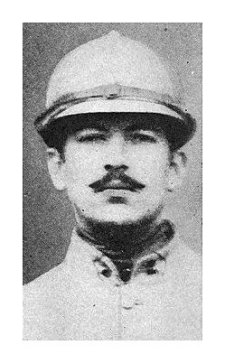
Alan Seeger
(1888-1916)
I Have a Rendezvous with Death . . .
I have a rendezvous with Death
At some disputed barricade,
When Spring comes back with rustling shade
And apple-blossoms fill the air —
I have a rendezvous with Death
When Spring brings back blue days and fair.
It may be he shall take my hand
And lead me into his dark land
And close my eyes and quench my breath —
It may be I shall pass him still.
I have a rendezvous with Death
On some scarred slope of battered hill,
When Spring comes round again this year
And the first meadow-flowers appear.
God knows ’twere better to be deep
Pillowed in silk and scented down,
Where Love throbs out in blissful sleep,
Pulse nigh to pulse, and breath to breath,
Where hushed awakenings are dear . . .
But I’ve a rendezvous with Death
At midnight in some flaming town,
When Spring trips north again this year,
And I to my pledged word am true,
I shall not fail that rendezvous.
Alan Seeger poetry
fleursdumal.nl magazine
More in: Archive S-T, Seeger, Alan
 The Sorrows of Young Werther (34)
by J.W. von Goethe
BOOK II.
OCTOBER 20.
We arrived here yesterday. The ambassador is indisposed, and will not
go out for some days. If he were less peevish and morose, all would
be well. I see but too plainly that Heaven has destined me to severe
trials; but courage! a light heart may bear anything. A light heart!
I smile to find such a word proceeding from my pen. A little more
lightheartedness would render me the happiest being under the sun.
But must I despair of my talents and faculties, whilst others of far
inferior abilities parade before me with the utmost self-satisfaction?
Gracious Providence, to whom I owe all my powers, why didst thou not
withhold some of those blessings I possess, and substitute in their
place a feeling of self-confidence and contentment?
But patience! all will yet be well; for I assure you, my dear friend,
you were right: since I have been obliged to associate continually with
other people, and observe what they do, and how they employ themselves,
I have become far better satisfied with myself. For we are so
constituted by nature, that we are ever prone to compare ourselves with
others; and our happiness or misery depends very much on the objects
and persons around us. On this account, nothing is more dangerous than
solitude: there our imagination, always disposed to rise, taking a new
flight on the wings of fancy, pictures to us a chain of beings of whom
we seem the most inferior. All things appear greater than they really
are, and all seem superior to us. This operation of the mind is quite
natural: we so continually feel our own imperfections, and fancy we
perceive in others the qualities we do not possess, attributing to them
also all that we enjoy ourselves, that by this process we form the idea
of a perfect, happy man,--a man, however, who only exists in our own
imagination.
But when, in spite of weakness and disappointments, we set to work in
earnest, and persevere steadily, we often find, that, though obliged
continually to tack, we make more way than others who have the
assistance of wind and tide; and, in truth, there can be no greater
satisfaction than to keep pace with others or outstrip them in the race.
The Sorrows of Young Werther (34)
by J.W. von Goethe
BOOK II.
OCTOBER 20.
We arrived here yesterday. The ambassador is indisposed, and will not
go out for some days. If he were less peevish and morose, all would
be well. I see but too plainly that Heaven has destined me to severe
trials; but courage! a light heart may bear anything. A light heart!
I smile to find such a word proceeding from my pen. A little more
lightheartedness would render me the happiest being under the sun.
But must I despair of my talents and faculties, whilst others of far
inferior abilities parade before me with the utmost self-satisfaction?
Gracious Providence, to whom I owe all my powers, why didst thou not
withhold some of those blessings I possess, and substitute in their
place a feeling of self-confidence and contentment?
But patience! all will yet be well; for I assure you, my dear friend,
you were right: since I have been obliged to associate continually with
other people, and observe what they do, and how they employ themselves,
I have become far better satisfied with myself. For we are so
constituted by nature, that we are ever prone to compare ourselves with
others; and our happiness or misery depends very much on the objects
and persons around us. On this account, nothing is more dangerous than
solitude: there our imagination, always disposed to rise, taking a new
flight on the wings of fancy, pictures to us a chain of beings of whom
we seem the most inferior. All things appear greater than they really
are, and all seem superior to us. This operation of the mind is quite
natural: we so continually feel our own imperfections, and fancy we
perceive in others the qualities we do not possess, attributing to them
also all that we enjoy ourselves, that by this process we form the idea
of a perfect, happy man,--a man, however, who only exists in our own
imagination.
But when, in spite of weakness and disappointments, we set to work in
earnest, and persevere steadily, we often find, that, though obliged
continually to tack, we make more way than others who have the
assistance of wind and tide; and, in truth, there can be no greater
satisfaction than to keep pace with others or outstrip them in the race.
 November 26.
I begin to find my situation here more tolerable, considering all
circumstances. I find a great advantage in being much occupied; and the
number of persons I meet, and their different pursuits, create a varied
entertainment for me. I have formed the acquaintance of the Count
C--and I esteem him more and more every day. He is a man of strong
understanding and great discernment; but, though he sees farther than
other people, he is not on that account cold in his manner, but capable
of inspiring and returning the warmest affection. He appeared interested
in me on one occasion, when I had to transact some business with him. He
perceived, at the first word, that we understood each other, and that
he could converse with me in a different tone from what he used with
others. I cannot sufficiently esteem his frank and open kindness to me.
It is the greatest and most genuine of pleasures to observe a great mind
in sympathy with our own.
The Sorrows of Young Werther (Die Leiden des jungen Werther) by J.W. von Goethe. Translated by R.D. Boylan.
To be continued
fleursdumal.nl magazine
November 26.
I begin to find my situation here more tolerable, considering all
circumstances. I find a great advantage in being much occupied; and the
number of persons I meet, and their different pursuits, create a varied
entertainment for me. I have formed the acquaintance of the Count
C--and I esteem him more and more every day. He is a man of strong
understanding and great discernment; but, though he sees farther than
other people, he is not on that account cold in his manner, but capable
of inspiring and returning the warmest affection. He appeared interested
in me on one occasion, when I had to transact some business with him. He
perceived, at the first word, that we understood each other, and that
he could converse with me in a different tone from what he used with
others. I cannot sufficiently esteem his frank and open kindness to me.
It is the greatest and most genuine of pleasures to observe a great mind
in sympathy with our own.
The Sorrows of Young Werther (Die Leiden des jungen Werther) by J.W. von Goethe. Translated by R.D. Boylan.
To be continued
fleursdumal.nl magazineMore in: -Die Leiden des jungen Werther, Goethe, Johann Wolfgang von
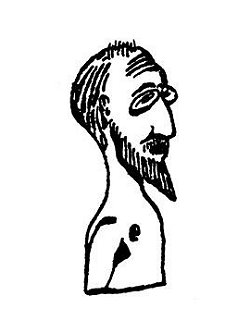
Erik Satie
(1866 – 1925)
Le Tennis
Play ?
Yes !
Le bon serveur.
Comme il a de belles jambes !
Il a un beau nez.
Service coupé.
Game !
21 avril 1914
Erik Satie Le Tennis
fleursdumal.nl magazine
More in: Archive S-T, MUSIC, Satie, Erik
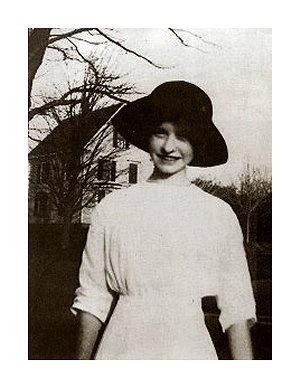
Eunice Tietjens
(1884 – 1944)
The Hand
As you sit so, in the firelight, your hand is the color of
new bronze.
I cannot take my eyes from your hand;
In it, as in a microcosm, the vast and shadowy Orient
is made visible.
Who shall read me your hand?
You are a large man, yet it is small and narrow, like the
hand of a woman and the paw of a chimpanzee.
It is supple and boneless as the hands wrought in pigment
by a fashionable portrait painter. The tapering
fingers bend backward.
Between them burns a scented cigarette. You poise it
with infinite daintiness, like a woman under the
eyes of her lover. The long line of your curved
nail is fastidiousness made flesh.
Very skilful is your hand.
With a tiny brush it can feather lines of ineffable suggestion,
glints of hidden beauty. With a little
tool it can carve strange dreams in ivory and
milky jade.
And cruel is your hand.
With the same cold daintiness and skill it can devise
exquisite tortures, eternities of incredible pain,
that Torquemada never glimpsed.
And voluptuous is your hand, nice in its sense of touch.
Delicately it can caress a quivering skin, softly it can
glide over golden thighs…. Bilitis had not
such long nails.
Who can read me your hand?
In the firelight the smoke curls up fantastically from
the cigarette between your fingers which are the
color of new bronze.
The room is full of strange shadows.
I am afraid of your hand….
(From The Interior)
Eunice Tietjens poetry
fleursdumal.nl magazine
More in: Archive S-T, Tietjens, Eunice

Literaire Salon in’t Wevershuisje 5
Emma Crebolder vertaalt Heilna du Plooy
Reis
Als het dan midwinter was
en ’s nachts het Hogeveld tot poeder
wordt geschroeid in koude en ijl rijp,
dan wilde Pa graag reizen
naar waar het warmer was.
Als wij in het donker nog vertrokken
werden wij in warme dekens toegestopt;
Buiten waren de gekende vormen onbekend
en vreemder nachtblauw bij het verder rijden.
Pa wijst waar de Drie Koningen staat,
Orion, en ook het Zuiderkruis.
Wij kijken steeds maar naar de lucht
verbaasd dat ook de maan kan ondergaan.
Als het lichter wordt,
de zon kogel kleurig rond verschijnt
dan moeten wij om ons heen kijken
en vertellen wat wij zien verdwijnen.
Pa geeft doorlopend les,
aardrijkskunde, plantkunde, dierkunde
en ook geschiedenis komt aan bod:
Kijk, hier begint het landschap te breken-
het binnenland is werkelijk een groot plateau.
Let op, wij rijden nu veel minder omhoog
dan omlaag. Kijk naar de heuvelige
glooiingen daar, de vogels, de soorten gras,
de bomen, hun schors en bladeren:
Als de ochtend gevorderd is, dan
zegt Pa: Voel, het is veel warmer hier.
En dan kijk ik, het Hogeveldse kind,
voorbij de koude en bekende
bleekheid in mijn hoofd
verrukt naar het nieuw gebied:
Langs de weg lange lanen van kersthulst
met grote slappe bloemen schelrood
tegen het groen, en her en der grote
massieve hopen kleur
waar bougainvillias hoog opklimmen
en dan omlaag regenen in roze en paars.
We hebben het land zo leren kennen
en door dat kennen ook lief gekregen.
Met die liefde liggen we nu overhoop:
We zijn met alles wat we zijn:
-dat voel ik in de politieke lucht hangen
een stigma, alleen verleden, vreemd, terloops.
Maar in mijn hoofd zijn de beelden gegrift
zoals in de genen waaruit ik stam:
Nooit hoor ik op een andere plek
zoals op deze, zelfs bij verstek.
Heilna du Plooy
(vertaald van het Zuid-Afrikaans in het Nederlands door Emma Crebolder)
Vertaalvrucht (nr 5): Emma Crebolder vertaalt Heilna du Plooy
Literaire Salon in’t Wevershuisje 5, foto Carina van der Walt
fleursdumal.nl magazine
More in: Archive C-D, Crebolder, Emma, Heilna du Plooy, Literaire Salon in 't Wevershuisje, VERTAALVRUCHT
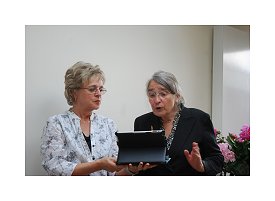
Emma Crebolder (R) & Heilna du Plooy (L)
Literaire Salon in ’t Wevershuisje 4
Heilna du Plooy vertaalt Emma Crebolder
Ons vruchtbaarst verleden
1.
Ons vruchtbaarst verleden lag
in geschriften en bij rivieren, op
keien of stenen aan Schelde of Waal.
De stroming sleepte ons mee.
We moesten de verhalen vinden.
Schorrevaar is achtergebleven. Ze
speelt met uitgeklapte vleugels voor
boek. Ze omvangt de meeuw en
gooit haar trots mijlenver op en wijst,
kijk daar: vriendin van schorrevaar.
2.
Alle lemuren en slingerapen
leren het grijpfijne in
oerbossen. Wij op het asfalt
worden getroffen door
breukzak en wervelzwakte.
Prijsdier Taal, je wordt zo vaak
misvat. Laat ons liever toch
gebaren. Een opgestoken hand
ontwapent hoe graag een mens ook
het brullen na zou willen apen.
Emma Crebolder
Ons vrugbaarste verlede
1.
Ons vrugbaarste verlede is op papier
en langs riviere vasgelê, op die keie
of klippe langs die Schelde of die Waal.
Die stroming het ons meegevoer.
Ons moes na die verhale soek.
Waterraaf het agtergebly. Sy flap
haar vlerke soos ’n boek wyd oop.
Sy omhels die meeu en gooi haar
trots hoog op in die lug en wys,
kyk daar: die vriendin van waterraaf.
2.
Die lemurs en die slingerape
leer almal fyngryp in
die oerbos. Ons hier
op die teer word getref deur
breuke en werwelverweer.
Skoudier Taal, jy word gereeld
verkeerd verstaan. Dan maar liewer
gebare gebruik. ‘n Uitgestrekte hand
ontwapen ook al sou ’n mens
graag ‘n gebrul wou na-aap.
Heilna du Plooy
Vertaling gedicht Emma Crebolder naar het Zuidafrikaans

Vertaalvrucht (nr 4): Emma Crebolder & Heilna du Plooy
Literaire Salon in’t Wevershuisje 4, foto Carina van der Walt
fleursdumal.nl magazine
More in: Archive C-D, Crebolder, Emma, Heilna du Plooy, Literaire Salon in 't Wevershuisje
 The Sorrows of Young Werther (33) by J.W. von Goethe ♦ SEPTEMBER 10. ♦ Oh, what a night, Wilhelm! I can henceforth bear anything. I shall never see her again. Oh, why cannot I fall on your neck, and, with floods of tears and raptures, give utterance to all the passions which distract my heart! Here I sit gasping for breath, and struggling to compose myself.
The Sorrows of Young Werther (33) by J.W. von Goethe ♦ SEPTEMBER 10. ♦ Oh, what a night, Wilhelm! I can henceforth bear anything. I shall never see her again. Oh, why cannot I fall on your neck, and, with floods of tears and raptures, give utterance to all the passions which distract my heart! Here I sit gasping for breath, and struggling to compose myself.
I wait for day, and at sunrise the horses are to be at the door. And she is sleeping calmly, little suspecting that she has seen me for the last time. I am free. I have had the courage, in an interview of two hours’ duration, not to betray my intention. And O Wilhelm, what a conversation it was!
Albert had promised to come to Charlotte in the garden immediately after supper. I was upon the terrace under the tall chestnut trees, and watched the setting sun. I saw him sink for the last time beneath this delightful valley and silent stream. I had often visited the same spot with Charlotte, and witnessed that glorious sight; and now–I was walking up and down the very avenue which was so dear to me. A secret sympathy had frequently drawn me thither before I knew Charlotte; and we were delighted when, in our early acquaintance, we discovered that we each loved the same spot, which is indeed as romantic as any that ever captivated the fancy of an artist.
From beneath the chestnut trees, there is an extensive view. But I remember that I have mentioned all this in a former letter, and have described the tall mass of beech trees at the end, and how the avenue grows darker and darker as it winds its way among them, till it ends in a gloomy recess, which has all the charm of a mysterious solitude. I still remember the strange feeling of melancholy which came over me the first time I entered that dark retreat, at bright midday. I felt some secret foreboding that it would, one day, be to me the scene of some happiness or misery.
I had spent half an hour struggling between the contending thoughts of going and returning, when I heard them coming up the terrace. I ran to meet them. I trembled as I took her hand, and kissed it. As we reached the top of the terrace, the moon rose from behind the wooded hill. We conversed on many subjects, and, without perceiving it, approached the gloomy recess. Charlotte entered, and sat down. Albert seated himself beside her. I did the same, but my agitation did not suffer me to remain long seated. I got up, and stood before her, then walked backward and forward, and sat down again. I was restless and miserable. Charlotte drew our attention to the beautiful effect of the moonlight, which threw a silver hue over the terrace in front of us, beyond the beech trees.
It was a glorious sight, and was rendered more striking by the darkness which surrounded the spot where we were. We remained for some time silent, when Charlotte observed, “Whenever I walk by moonlight, it brings to my remembrance all my beloved and departed friends, and I am filled with thoughts of death and futurity. We shall live again, Werther!” she continued, with a firm but feeling voice; “but shall we know one another again what do you think? what do you say?”
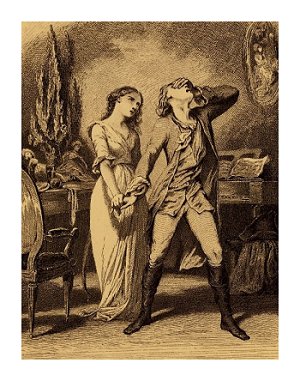 “Charlotte,” I said, as I took her hand in mine, and my eyes filled with tears, “we shall see each other again–here and hereafter we shall meet again.” I could say no more. Why, Wilhelm, should she put this question to me, just at the moment when the fear of our cruel separation filled my heart?
“Charlotte,” I said, as I took her hand in mine, and my eyes filled with tears, “we shall see each other again–here and hereafter we shall meet again.” I could say no more. Why, Wilhelm, should she put this question to me, just at the moment when the fear of our cruel separation filled my heart?
“And oh! do those departed ones know how we are employed here? do they know when we are well and happy? do they know when we recall their memories with the fondest love? In the silent hour of evening the shade of my mother hovers around me; when seated in the midst of my children,
I see them assembled near me, as they used to assemble near her; and then I raise my anxious eyes to heaven, and wish she could look down upon us, and witness how I fulfil the promise I made to her in her last moments, to be a mother to her children. With what emotion do I then exclaim, ‘Pardon, dearest of mothers, pardon me, if I do not adequately supply your place! Alas! I do my utmost. They are clothed and fed; and, still better, they are loved and educated. Could you but see, sweet saint! the peace and harmony that dwells amongst us, you would glorify God with the warmest feelings of gratitude, to whom, in your last hour, you addressed such fervent prayers for our happiness.'” Thus did she express herself; but O Wilhelm! who can do justice to her language? how can cold and passionless words convey the heavenly expressions of the spirit? Albert interrupted her gently. “This affects you too deeply, my dear Charlotte. I know your soul dwells on such recollections with intense delight; but I implore–” “O Albert!” she continued, “I am sure you do not forget the evenings when we three used to sit at the little round table, when papa was absent, and the little ones had retired. You often had a good book with you, but seldom read it; the conversation of that noble being was preferable to everything,–that beautiful, bright, gentle, and yet ever-toiling woman. God alone knows how I have supplicated with tears on my nightly couch, that I might be like her.”
I threw myself at her feet, and, seizing her hand, bedewed it with a thousand tears. “Charlotte!” I exclaimed, “God’s blessing and your mother’s spirit are upon you.” “Oh! that you had known her,” she said, with a warm pressure of the hand. “She was worthy of being known to you.” I thought I should have fainted: never had I received praise so flattering. She continued, “And yet she was doomed to die in the flower of her youth, when her youngest child was scarcely six months old. Her illness was but short, but she was calm and resigned; and it was only for her children, especially the youngest, that she felt unhappy. When her end drew nigh, she bade me bring them to her. I obeyed. The younger ones knew nothing of their approaching loss, while the elder ones were quite overcome with grief. They stood around the bed; and she raised her feeble hands to heaven, and prayed over them; then, kissing them in turn, she dismissed them, and said to me, ‘Be you a mother to them.’
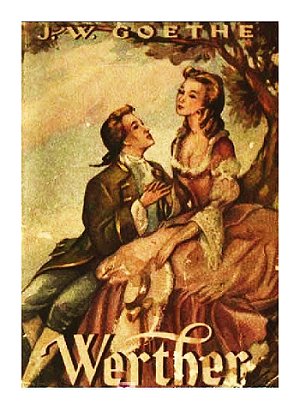 I gave her my hand. ‘You are promising much, my child,’ she said: ‘a mother’s fondness and a mother’s care! I have often witnessed, by your tears of gratitude, that you know what is a mother’s tenderness: show it to your brothers and sisters, and be dutiful and faithful to your father as a wife; you will be his comfort.’ She inquired for him. He had retired to conceal his intolerable anguish,–he was heartbroken, ‘Albert, you were in the room.’ She heard some one moving: she inquired who it was, and desired you to approach. She surveyed us both with a look of composure and satisfaction, expressive of her conviction that we should be happy,–happy with one another.” Albert fell upon her neck, and kissed her, and exclaimed, “We are so, and we shall be so!” Even Albert, generally so tranquil, had quite lost his composure; and I was excited beyond expression.
I gave her my hand. ‘You are promising much, my child,’ she said: ‘a mother’s fondness and a mother’s care! I have often witnessed, by your tears of gratitude, that you know what is a mother’s tenderness: show it to your brothers and sisters, and be dutiful and faithful to your father as a wife; you will be his comfort.’ She inquired for him. He had retired to conceal his intolerable anguish,–he was heartbroken, ‘Albert, you were in the room.’ She heard some one moving: she inquired who it was, and desired you to approach. She surveyed us both with a look of composure and satisfaction, expressive of her conviction that we should be happy,–happy with one another.” Albert fell upon her neck, and kissed her, and exclaimed, “We are so, and we shall be so!” Even Albert, generally so tranquil, had quite lost his composure; and I was excited beyond expression.
“And such a being,” She continued, “was to leave us, Werther! Great God, must we thus part with everything we hold dear in this world? Nobody felt this more acutely than the children: they cried and lamented for a long time afterward, complaining that men had carried away their dear mamma.”
Charlotte rose. It aroused me; but I continued sitting, and held her hand. “Let us go,” she said: “it grows late.” She attempted to withdraw her hand: I held it still. “We shall see each other again,” I exclaimed: “we shall recognise each other under every possible change! I am going,”
I continued, “going willingly; but, should I say for ever, perhaps I may not keep my word. Adieu, Charlotte; adieu, Albert. We shall meet again.” “Yes: tomorrow, I think,” she answered with a smile. Tomorrow! how I felt the word! Ah! she little thought, when she drew her hand away from mine. They walked down the avenue. I stood gazing after them in the moonlight. I threw myself upon the ground, and wept: I then sprang up, and ran out upon the terrace, and saw, under the shade of the linden-trees, her white dress disappearing near the garden-gate. I stretched out my arms, and she vanished.
The Sorrows of Young Werther (Die Leiden des jungen Werther) by J.W. von Goethe. Translated by R.D. Boylan.
To be continued
fleursdumal.nl magazine for art & literature
More in: -Die Leiden des jungen Werther, Goethe, Johann Wolfgang von
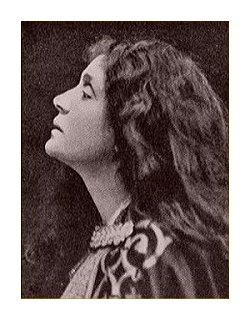
Sara Teasdale
(1884 – 1933)
The Kiss
I hoped that he would love me,
And he has kissed my mouth,
But I am like a stricken bird
That cannot reach the south.
For tho’ I know he loves me,
To-night my heart is sad;
His kiss was not so wonderful
As all the dreams I had.
Sara Teasdale poetry
fleursdumal.nl magazine
More in: Archive S-T, Teasdale, Sara
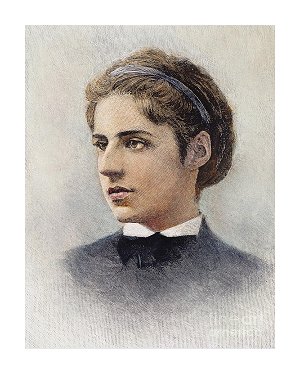
Emma Lazarus
(1849 – 1887)
Longing
Look westward o’er the steaming rain-washed slopes,
Now satisfied with sunshine, and behold
Those lustrous clouds, as glorious as our hopes,
Softened with feathery fleece of downy gold,
In all fantastic, huddled shapes uprolled,
Floating like dreams, and melting silently,
In the blue upper regions of pure sky.
The eye is filled with beauty, and the heart
Rejoiced with sense of life and peace renewed;
And yet at such an hour as this, upstart
Vague myriad longing, restless, unsubdued,
And causeless tears from melancholy mood,
Strange discontent with earth’s and nature’s best,
Desires and yearnings that may find no rest.
Emma Lazarus poetry
fleursdumal.nl magazine
More in: Archive K-L, Lazarus, Emma
 The Sorrows of Young Werther (32) by J.W. von Goethe ♦ AUGUST 30. ♦ Unhappy being that I am! Why do I thus deceive myself? What is to come of all this wild, aimless, endless passion? I cannot pray except to her.
The Sorrows of Young Werther (32) by J.W. von Goethe ♦ AUGUST 30. ♦ Unhappy being that I am! Why do I thus deceive myself? What is to come of all this wild, aimless, endless passion? I cannot pray except to her.
My imagination sees nothing but her: all surrounding objects are of no account, except as they relate to her. In this dreamy state I enjoy many happy hours, till at length I feel compelled to tear myself away from her. Ah, Wilhelm, to what does not my heart often compel me! When I have spent several hours in her company, till I feel completely absorbed by her figure, her grace, the divine expression of her thoughts, my mind becomes gradually excited to the highest excess, my sight grows dim, my hearing confused, my breathing oppressed as if by the hand of a murderer, and my beating heart seeks to obtain relief for my aching senses. I am sometimes unconscious whether I really exist. If in such moments I find no sympathy, and Charlotte does not allow me to enjoy the melancholy consolation of bathing her hand with my tears, I feel compelled to tear myself from her, when I either wander through the country, climb some precipitous cliff, or force a path through the trackless thicket, where I am lacerated and torn by thorns and briers; and thence I find relief. Sometimes I lie stretched on the ground, overcome with 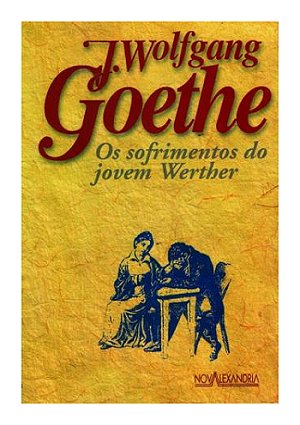 fatigue and dying with thirst; sometimes, late in the night, when the moon shines above me, I recline against an aged tree in some sequestered forest, to rest my weary limbs, when, exhausted and worn, I sleep till break of day. O Wilhelm! the hermit’s cell, his sackcloth, and girdle of thorns would be luxury and indulgence compared with what I suffer. Adieu! I see no end to this wretchedness except the grave.
fatigue and dying with thirst; sometimes, late in the night, when the moon shines above me, I recline against an aged tree in some sequestered forest, to rest my weary limbs, when, exhausted and worn, I sleep till break of day. O Wilhelm! the hermit’s cell, his sackcloth, and girdle of thorns would be luxury and indulgence compared with what I suffer. Adieu! I see no end to this wretchedness except the grave.
♦ SEPTEMBER 3. ♦ I must away. Thank you, Wilhelm, for determining my wavering purpose. For a whole fortnight I have thought of leaving her. I must away. She has returned to town, and is at the house of a friend. And then, Albert–yes, I must go.
The Sorrows of Young Werther (Die Leiden des jungen Werther) by J.W. von Goethe. Translated by R.D. Boylan
To be continued
fleursdumal.nl magazine for art & literature
More in: -Die Leiden des jungen Werther, Goethe, Johann Wolfgang von
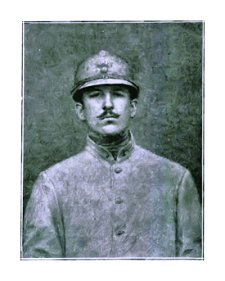
Alan Seeger
(1888-1916)
The Need to Love
The need to love that all the stars obey
Entered my heart and banished all beside.
Bare were the gardens where I used to stray;
Faded the flowers that one time satisfied.
Before the beauty of the west on fire,
The moonlit hills from cloister-casements viewed,
Cloud-like arose the image of desire,
And cast out peace and maddened solitude.
I sought the City and the hopes it held:
With smoke and brooding vapors intercurled,
As the thick roofs and walls close-paralleled
Shut out the fair horizons of the world —
A truant from the fields and rustic joy,
In my changed thought that image even so
Shut out the gods I worshipped as a boy
And all the pure delights I used to know.
Often the veil has trembled at some tide
Of lovely reminiscence and revealed
How much of beauty Nature holds beside
Sweet lips that sacrifice and arms that yield:
Clouds, window-framed, beyond the huddled eaves
When summer cumulates their golden chains,
Or from the parks the smell of burning leaves,
Fragrant of childhood in the country lanes,
An organ-grinder’s melancholy tune
In rainy streets, or from an attic sill
The blue skies of a windy afternoon
Where our kites climbed once from some grassy hill:
And my soul once more would be wrapped entire
In the pure peace and blessing of those years
Before the fierce infection of Desire
Had ravaged all the flesh. Through starting tears
Shone that lost Paradise; but, if it did,
Again ere long the prison-shades would fall
That Youth condemns itself to walk amid,
So narrow, but so beautiful withal.
And I have followed Fame with less devotion,
And kept no real ambition but to see
Rise from the foam of Nature’s sunlit ocean
My dream of palpable divinity;
And aught the world contends for to mine eye
Seemed not so real a meaning of success
As only once to clasp before I die
My vision of embodied happiness.
Alan Seeger poetry
fleursdumal.nl magazine
More in: Archive S-T, Seeger, Alan
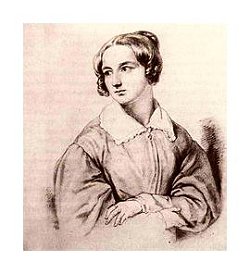
Luise Hensel
(1798-1876)
Zug der Liebe
Ach! vergessen könnt’ ich nimmer
Seiner Liebe, Seiner Pein.
Sein gedenken will ich immer;
Garten, Feld und Wald und Zimmer
Soll mir stets ein Bethaus sein.
Stündlich will ich Ihn begrüßen:
»Sei gepriesen, süßer Freund!«
Alle Blumen, die da sprießen,
Will ich mit dem Thau begießen,
Den um Ihn mein Auge weint. –
Keine Gaben, keine Freuden,
Keine Krone dieser Welt!
Freudig will ich Alles meiden,
Will nur Er von mir nicht scheiden,
Den mein Herz so innig hält.
Wer ein Tröpflein durfte trinken,
Herr! aus Deinem Gnadenmeer,
Der muß ganz darin versinken,
Folgen einzig Deinen Winken
Ohne Sinne, ohn’ Gehör.
Und ich kann Dich nimmer lassen,
Ewig halt’ ich Dich umarmt.
Wolltest Du mich fliehn und hassen,
Müßt’ ich noch Dein Kreuz umfassen,
Bis es jeden Stein erbarmt.
Wärst Du nicht im Himmel drinnen,
Nimmer sehnt’ ich mich hinein. –
All mein Wissen, all mein Sinnen,
Herr! laß ganz in Dich verrinnen,
Ganz in Dir verloren sein.
Münster, Sommer 1819.
Luise Hensel poetry
fleursdumal.nl magazine
More in: Archive G-H, CLASSIC POETRY
Thank you for reading Fleurs du Mal - magazine for art & literature